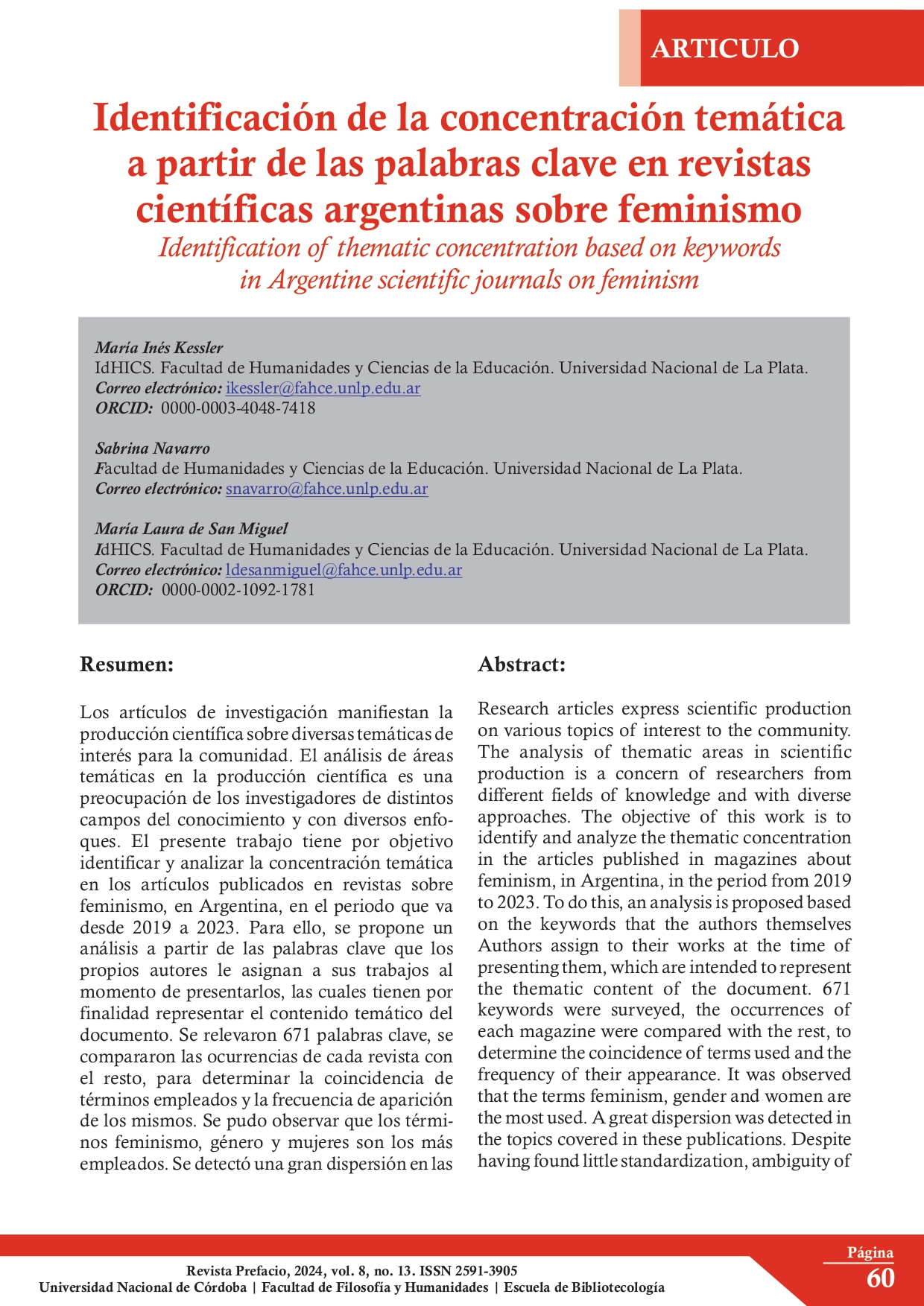Identification of thematic concentration based on keywords in Argentine scientific journals on feminism
DOI:
https://doi.org/10.58312/2591.3905.v8.n13.47589Keywords:
Natural language, Content analysis, Research articles, Scientific dissemination, FeminismAbstract
Research articles express scientific production on various topics of interest to the community. The analysis of thematic areas in scientific production is a concern of researchers from different fields of knowledge and with diverse approaches. The objective of this work is to identify and analyze the thematic concentration in the articles published in magazines about feminism, in Argentina, in the period from 2019 to 2023. To do this, an analysis is proposed based on the keywords that the authors themselves Authors assign to their works at the time of presenting them, which are intended to represent the thematic content of the document. 671 keywords were surveyed, the occurrences of each magazine were compared with the rest, to determine the coincidence of terms used and the frequency of their appearance. It was observed that the terms feminism, gender and women are the most used. A great dispersion was detected in the topics covered in these publications. Despite having found little standardization, ambiguity of terms and dispersion, the topics addressed by the researchers have been able to be detected and grouped to determine the thematic concentration of the area.
Downloads
References
Barité, M. et al. (2015). Organización del conocimiento: Clasificación, Indización, Terminología (6a. ed). CSIC.
Cereghino-Fedrigo, A. M. (2022). Revisión del buen uso de las palabras clave en las revistas de arquitectura iberoamericanas, en cuanto a frecuencia y tendencia. Revista de Arquitectura, 24(2), 3-9. https://www.redalyc.org/journal/1251/125173916001/html/
Díaz Herrera, C. (2018) Investigación cualitativa y análisis de contenido temático. Orientación intelectual de revista Universum. Revista General de Información y Documentación, 28(1), 119-142. https://core.ac.uk/download/pdf/159630116.pdf
Gil-Leiva, I y Alonso-Arroyo, A. (2005). La relación entre las palabras clave aportadas por autores de artículos de revista y su indización en las bases de datos ISOC, IME E ICYT. Revista Española De Documentación Científica, 28(1),62-79. DOI: 10.3989/redc.2005.v 28.i 1.165
González Tous M, y Mattar S. (2011). Las claves de las palabras clave en los artículos científicos. Revista MVZ Córdoba 17(2), 2955-2956, 2011. https://www.redalyc.org/pdf/693/69323751001.pdf
Liberatore, G., Coringrato, M., & Amerio, A. (2003). Estudio de la producción profesional en Bibliotecología en la Argentina: análisis de dominio de la revista Referencias. Transinformação, 15(2), 1–10. https://periodicos.puc-campinas.edu.br/transinfo/article/view/6402
Mancini, I., Riveiro, M., & Ramírez Ibarra, I. (2019). Representación de áreas temáticas en las revistas latinoamericanas de Bibliotecología y Ciencia de la información en español (2008-2016). Información, Cultura Y Sociedad, (40), 13-30. DOI:10.34096/ics.i40.5348
Massa. J (2022). Revistas digitales feministas: periodismo situado y con agenda propia. Cuadernos del CIPeCo. 2(3). https://revistas.unc.edu.ar/index.php/CIPeCo/article/view/40221/40487
Méndez Rodríguez, E. y Moreiro González, J. A. (1999). Lenguaje natural e Indización automatizada. Ciencias de la Información 30(3), 11-24. http://eprints.rclis.org/12685/
Niz Ramos, J. (2019). La clave de las palabras clave. Ginecología y Obstetricia en México 87(3). https://www.scielo.org.mx/pdf/gom/v87n3/0300-9041-gom-87-03-00001.pdf
Padilla, P., Coloma, J., Petit Breuilh, J., Mena, L., Barrios, D., Weinacker, D., Vásquez, F., Villalobos, B., Alister, C., & Cancino, R. (2017). Identificación de áreas temáticas científicas mediante el análisis de co-palabras. El caso de la Universidad de La Frontera, Chile. Investigación Bibliotecológica: Archivonomía, bibliotecología E información, 31(72), 63–80. DOI: 10.22201/iibi.0187358xp.2017.72.57824
Peña Vera, T. (2010). El acceso al saber requiere aplicar organización y representación del conocimiento. Revista Interamericana de Bibliotecología. 33(1). 13–29. http://www.scielo.org.co/scielo.php?script=sci_arttext&pid=S0120-09762010000100001
Tena Parera, D. (2021). Palabras clave apropiadas. Gráfica, 9(18), 71-76. DOI: https://doi.org/10.5565/rev/grafica.229








